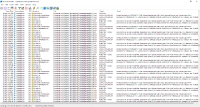Details
-
Bug
-
Status: Closed (View Workflow)
-
Critical
-
Resolution: Fixed
-
10.5(EOL), 10.6
-
Microsoft Windows
Description
2023-08-14 9:13:29 0 [Note] InnoDB: Uses event mutexes
2023-08-14 9:13:29 0 [Note] InnoDB: Compressed tables use zlib 1.2.12
2023-08-14 9:13:29 0 [Note] InnoDB: Number of pools: 1
2023-08-14 9:13:29 0 [Note] InnoDB: Using crc32 + pclmulqdq instructions
2023-08-14 9:13:29 0 [Note] InnoDB: Initializing buffer pool, total size = 5368709120, chunk size = 134217728
2023-08-14 9:13:29 0 [Note] InnoDB: Completed initialization of buffer pool
2023-08-14 9:13:31 0 [Note] InnoDB: 128 rollback segments are active.
2023-08-14 9:17:50 0 [Note] InnoDB: Creating shared tablespace for temporary tables
2023-08-14 9:17:50 0 [Note] InnoDB: Setting file '.\ibtmp1' size to 12 MB. Physically writing the file full; Please wait ...
2023-08-14 9:17:50 0 [Note] InnoDB: File '.\ibtmp1' size is now 12 MB.
2023-08-14 9:17:50 0 [Note] InnoDB: 10.5.22 started; log sequence number 197013855628; transaction id 455278971
2023-08-14 9:13:31 0 [Note] InnoDB: 128 rollback segments are active.
2023-08-14 9:17:50 0 [Note] InnoDB: Creating shared tablespace for temporary tables.
MySQL starts slowly, rollback segments and Creating shared tablespace with an interval of over 4 minutes.
Attachments
Issue Links
- relates to
-
MDEV-32228 Optimize is_file_on_ssd() to speedup opening tablespaces on Windows
-
- Closed
-
-
MDEV-33360 fil_node_t::handle had better not be protected by fil_system.mutex
-
- Confirmed
-



